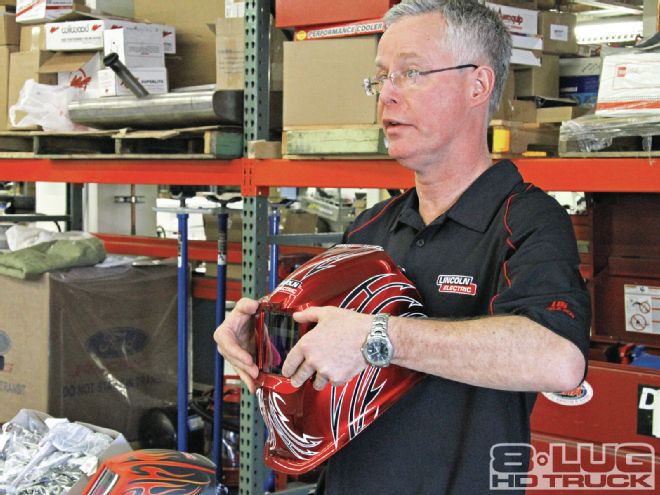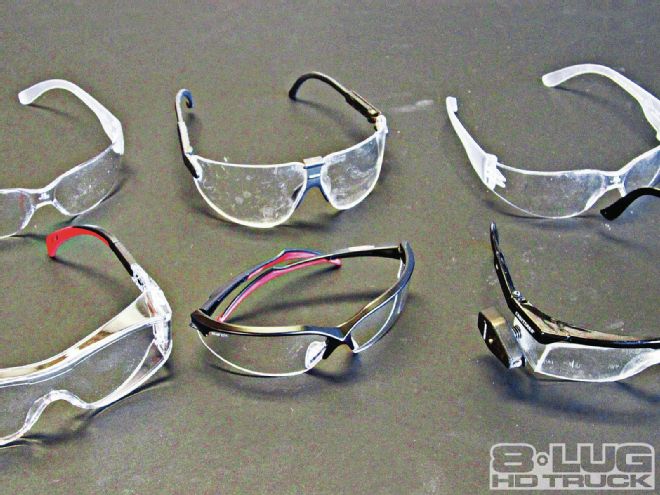Power tools make projects easier and often more precise than using ordinary handtools. But with their many benefits come serious safety concerns: power tools are responsible for tens of thousands of accidents each year, many which could have been avoided by using proper safety gear. The same safety logic applies to using portable welders and plasma cutters.
The point is, no matter how much we enjoy our home shop tools, we also need to have a healthy respect for them. That starts with knowing their limitations and taking some precautions before we start a project.
Let’s look at some of the most common types of safety gear that should be in every home shop. Safety gear doesn’t have to be expensive. But it should be certified by ANSI, OSHA, or another independent testing lab.
Common Injuries and Prevention
Eye injuries account for the most common type of serious accidents caused by power tools, welders, and plasma cutters. However, an operator isn’t the only one who needs to be safer. Bystanders should be protected against flying shards of metal, or welder’s flash as well.
It only takes seconds to put on a pair of safety glasses, a face shield, or a welding helmet, but sometimes people forget or cut corners and think they don’t need this gear for quick jobs. Don’t believe it. Eye injuries can happen faster than you can blink.
There’s a misconception that prescription glasses protect our eyes when using power tools like grinders. They really don’t. Prescription glasses offer little protection from particles entering from the side, and the lens is typically not designed to prevent flying impacts that can shatter glass or plastic. That’s why you should always wear ANSI- or OSHA-approved protective eyewear when using standard power tools. Safety glasses are cheap. We found safety glasses that meet ANSI Z87.1 standards starting at less than $2 each from Harbor Freight, so they don’t have to be expensive. A step up in eye protection is the clear, full-face shield that provides room to wear a breathing respirator.
For any type of electronic welding, such as MIG or TIG, do-it-yourselfers need to protect themselves against “photokeratitis” or welder’s flash, which can cause permanent eye damage. Lincoln-Electric, Hobart, and Miller Electric offer some of the best welding helmets on the market for all sorts of jobs.
Again, you don’t necessarily need a fancy helmet with flames painted on it, just one that is certified for your particular project. But don’t go cheap with welder’s helmets, because risking your eyesight is not worth the minimal savings you’ll net by selecting the most economical model. Although a good pair of welding safety glasses offering shade 3 or shade 5 lenses can be used for limited torch soldering, brazing, and cutting, these are not designed for electronic welding. Arc welding requires darker lenses that are found in welding helmets with certification.

| At home, we always leave a shop apron and safety glasses right by our bench grinder and never use it without them.

| Lincoln-Electric stopped by our offices and gave us a hands-on look at its latest safety gear for welders.
Aprons and More
We’re not talking about those silly barbecue aprons you wear on the weekends. The typical shop apron is made of leather, although there are safety PVC/polyester aprons for chemicals and cloth aprons for woodworking.
Aprons keep clothes clean for starters, but leather aprons also prevent sparks and flying bits of metal from burning holes through your duds. All aprons also help keep loose clothing away from the equipment you are using.
A step up from an apron, the full leather or flame-resistant cotton jacket is used when welding. There are a lot of styles, and Miller Electric and Lincoln-Electric just introduced some new lines that are a vast improvement over old-school welding gear.
Gloves
There are many varieties of good work gloves on the market, but the best for general shop work offer some sort of heat protection as well as dexterity for the fingers. Gloves come in leather, rubber, cloth, canvas, and just about every type of material you can imagine. But when working with power tools, the thing to keep in mind is having maximum dexterity. You do not want a glove to interfere with your power tool, and you shouldn’t wear poor fitting gloves around grinders because they can easily get caught in the wheel.
Welding requires different types of gloves than general shop work because of heat. Don’t buy just one pair—plan on purchasing gloves designed for each type of work you plan to do.

| Skull caps, gloves, and bandanas should be part of your home shop equipment.
Sleeves and Clothing
Protection sleeves and clothing (pants) are another aspect of safety gear. Sleeves protect your forearms from sparks and metal and are used primarily for welding, but they can come in handy when grinding, too. Safety clothing is cumbersome to wear for everyday work in a shop, but nevertheless, it will reduce the possibilities of serious injuries. Again, clothing needs to be certified for shop use.
It’s good to get in the habit of wearing as much safety clothing as possible. No matter what you’ve seen at your buddy’s house, never wear flip flops and shorts when working with any type of power tool or welder. And always keep any loose-fitting clothes tucked in and away from the machine. If you wear long-sleeve shirts, roll the sleeves up so they are out of the way of the equipment and don’t take unnecessary risks.

| When Miller Electric stopped by the Irvine, California, tech center, the crew gave us a hands-on demo on MIG-welding as well as an overview on safety.

| These are our safety glasses, and we’ve actually added to our collection since this photo was taken. Once the lenses get too badly scratched, toss them out. They are so cheap that you can afford to buy a dozen for less than $25. The pair on the far right have mini LED lights!
“The point is, no matter how much we enjoy our home shop tools, we also need to have a healthy respect for them.”
Head Gear
Whether you are welding or using a grinder, saw, or sandblaster, having your head protected is critical. Don’t rely on a cheap hairnet—you should always use certified bandanas or skull caps. Certified earmuffs or plugs can protect your hearing and should always be worn when working around noisy equipment. Never substitute recreational (iPod) earplugs for certified workshop earplugs! There are passive earmuffs and electronic earmuffs, and depending on the type of shop noise, they offer different levels of protection. Most of all, ensure the earmuffs fit properly.
Respirators
No safety gear story would be complete without a mention of respirators. We’re not going to dive into paint spray booth respirators, but for general shop work, you should always have several types of particulate respirators. Again, look for a respirator that has been certified by an approving agency like the National Institute for Occupational Safety and Health (NIOSH) or OSHA. A good respirator will have easily replaceable filters and adjustments for fitment. Don’t confuse a particulate respirator with a dust mask found at your local hardware store—they aren’t the same. Particulate respirators are available for varying percentages of filtering. Pick which is best for your projects and use it whenever particles get airborne!

| This is the Signature One-Step dual cartridge particulate respirator that is NIOSH approved from Gerson, and a clear, full-face shield. Harbor Freight has a complete line of safety equipment at prices that can’t be beat.
First Aid Kits
To complete your safety equipment, always have a first aid kit available should you need to use it for even minor accidents. Eyewash, bandages, burn relief, antiseptic, and pads should be included in your kit. Quick treatment can prove to be the difference between a minor and serious injury.

| Miller Electric offers shade 3 and shade 5 glasses designed for plasma cutting and non-electric welding.
 | Lincoln-Electric stopped by our offices and gave us a hands-on look at its latest safety gear for welders.
Aprons and More
| Lincoln-Electric stopped by our offices and gave us a hands-on look at its latest safety gear for welders.
Aprons and More | These are our safety glasses, and we’ve actually added to our collection since this photo was taken. Once the lenses get too badly scratched, toss them out. They are so cheap that you can afford to buy a dozen for less than $25. The pair on the far right have mini LED lights!
| These are our safety glasses, and we’ve actually added to our collection since this photo was taken. Once the lenses get too badly scratched, toss them out. They are so cheap that you can afford to buy a dozen for less than $25. The pair on the far right have mini LED lights!